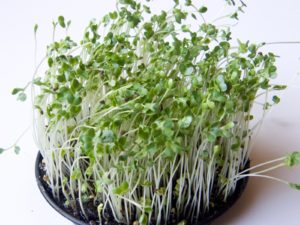
Broccoli Sprouts and Autism
Dr. Michael Greger recently shared the results of a Johns Hopkins study which showed improved behavior among autistic patients treated with a broccoli sprout extract. The improvement was greater than any ever experienced with a pharmaceutical drug. Needless to say, this is an exciting development in the field of autism research. However, there are reasons to temper our excitement for the time being.
- Chief researcher Andrew Zimmerman cautioned against drawing big conclusions stating: “I really want to stress to people that this study needs to be replicated to demonstrate that it is valid.”
- Some independent researchers have similar reservations, noting that the control group showed an unusually small placebo response.
“You always see a 20 to 25 percent improvement in placebo,” says John Jay Gargus, director of the Center for Autism Research and Translation at the University of California, Irvine. “It’s stunning that they’ve managed to have found a placebo that doesn’t give the placebo effect that we see in every other neuropsychiatric drug trial,” Gargus says.
- Jeremy Veenstra-VanderWeele, associate professor of psychiatry at Columbia University in New York, is skeptical about whether the results will hold up in other trials and in the broader population of people with autism. One concern is that 80 percent of the study participants had a history of behavioral improvements during bouts of fever. Surveys estimate that roughly 30 percent of people with autism show this ‘fever effect.’ “That makes this population a little different than the typical population,” Veenstra-VanderWeele says.
What’s more, the improvement seen with the extract is comparable to that seen with placebo in a previous trial that involved hundreds of people with autism. The benefit is probably too low to hold up in a bigger trial, says Veenstra-VanderWeele.
- The broccoli sprout extract used in the study is a non-commercial product. Study researcher Paul Talalay states “it would be very difficult to achieve the levels of sulphoraphane used in the study by eating large amounts of broccoli or other cruciferous vegetables.
- The study was partially funded by the Brassica Foundation for Chemoprotection Research
- Broccoli sprouts and seeds rich in glucosinolates have been licensed by Johns Hopkins to Brassica Protection Products LLC; Antony Talalay, son of Paul Talalay, is chief executive officer. The university owns Brassica Protection Products stock, which is subject to certain restrictions under university policy. This arrangement has been reviewed and approved by the Johns Hopkins University in accordance with its conflict of interest policies.
Cautious Optimism
Although Jeremy Veestra-VanderWeele is a skeptic, he still advocates that the study’s findings warrant follow-up in a larger population: “If this replicates, it’s really exciting in part because it seems very unlikely to do harm”.
As Dr. Greger often states when preliminary research shows a possible mitigation of symptoms from various diseases with whole foods: “What’s the harm in trying while waiting for a definitive answer?”
Click here for more info on broccoli sprouts.
Stay healthy and strong!






 E Excerpt from Laurie Endicott Thomas’s amazing book Thin Diabetes – Fat Diabetes by clicking here!
E Excerpt from Laurie Endicott Thomas’s amazing book Thin Diabetes – Fat Diabetes by clicking here!
Speak Your Mind